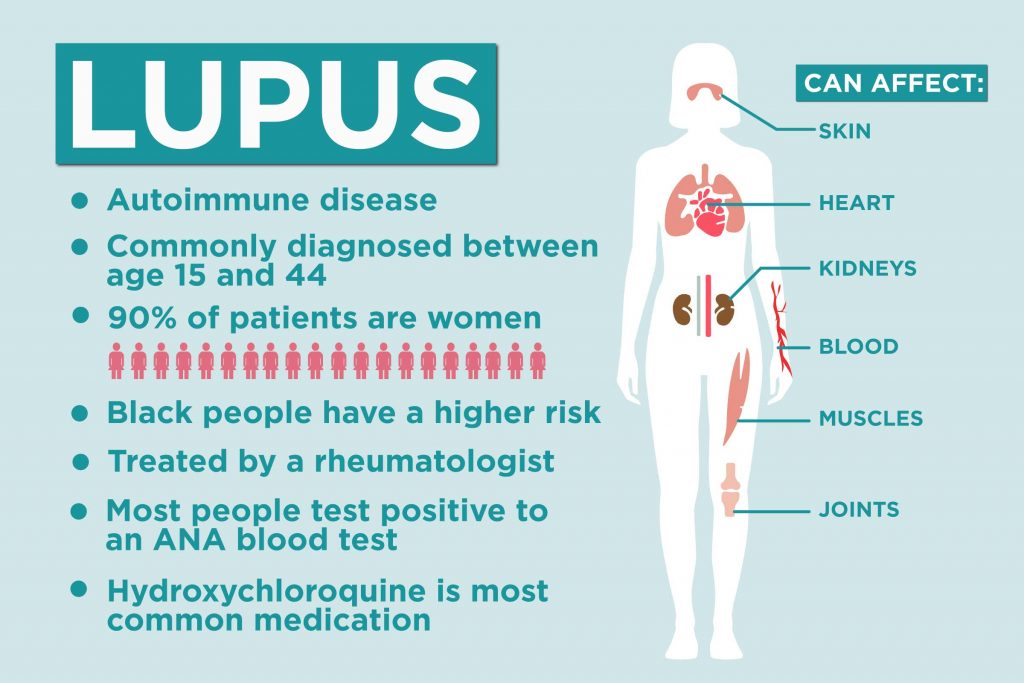Lupus also called SLE, systemic lupus erythematosus is an inflammatory disease caused when the immune system attacks its own tissues and organs. Lupus (SLE) can affect the joints, skin, kidneys, blood cells, brain, heart, and lungs. It can be difficult to diagnose because its signs and symptoms often mimic those of other ailments. Symptoms vary but can include fatigue, joint pain, rash, and fever. These can periodically get worse (flare-ups) and then improve. Some people are born with a tendency toward developing lupus, which may be triggered by infections, certain drugs, or even sunlight. While there’s no cure for lupus, current treatments focus on improving quality of life through controlling symptoms and minimizing flare-ups. This begins with lifestyle modifications, including sun protection and diet. Further disease management includes medications, such as anti-inflammatories and steroids.
MY STORY
It was back in 1990 and I was having some dramatic health issues. Up until then, I had been healthy. So after having surgery, I started to heal and was starting to feel myself again. But then things started happening. I became tired easily and just not feeling well. It was hard to describe. I was one of those who spent a lot of time outdoors. But that summer I was getting rashes and didn’t understand. So off to the doctor I went and dreaded it. After some tests, the doctor told me I had Lupus. He wasn’t able to tell me much other than it was an autoimmune disease and there was no cure. I was also told that some people have a shorter lifespan as the body starts to attack itself. There were medications (steroids) that will help with the symptoms. Not a good prognosis and not what I wanted to hear. I had no idea what to do but I wasn’t going to take steroids!
Top 5 Things Most People Don’t Know About Lupus (and you wish they did)
1) It is NOT Contagious
I repeat. LUPUS IS NOT CONTAGIOUS. It is an autoimmune disease.
2) It is the Great Mimicker
Feeling tired, nauseous, and having overall malaise? You could have lupus! Or ten thousand other conditions that can cause those exact symptoms. Because lupus symptoms can mimic those of so many other illnesses, it can be incredibly hard to diagnose.
3) It Affects Minority Women the Most
1.5 million Americans are afflicted in some form, while more than 5 million are known to have it worldwide. Of those affected, 90 percent of them are women and 80 percent are between the ages of 15 and 45. People of color are 2 to 3 more times likely to be diagnosed than Caucasians.
4) It Affects Everyone Differently
It is true, you can have lupus and look perfectly “normal” on the outside–which can be a blessing and a curse. Some people experience only internal symptoms like kidney, heart, and lung issues. Some people experience only external symptoms like skin lesions, malar rash, and hair loss (alopecia). It is almost impossible to find two lupus patients with the exact same symptoms. Moreover, it is unfair and illogical to compare two patients. It is also unfair to judge someone who may not “look” ill. So, before anyone utters the words “But, you don’t look sick” to someone who is chronically ill, he/she should be forewarned that it is really invalidating, particularly if someone is in a flare and feels like roadkill on the inside.
5) There is No Cure, But It Can Go Into Remission
At times, patients may have periods with few or no symptoms, commonly called remissions, but symptoms rarely disappear completely. At other times the patient may have debilitating disease activity with severe symptoms. Sadly, there is still no cure; however, 80 to 90% of people with Lupus can live a normal lifespan.
I’m a fighter so this was no different. Just another battle, right? So I started doing research and looking at alternatives. I was not going to submit my body to the ramifications of steroids and chemicals. I decided to learn about herbal medications and supplements. In my search, I found a supplement company that started my search into natural products. Its product offerings made me confident that I would be able to combat this disease successfully. I did find the products that stabilized my body and systems. When I go to the doctors now they tell me to keep doing whatever I’m doing because it’s working.
In general, people with lupus should aim for a well-balanced diet that includes plenty of fruits, vegetables, and whole grains. It should also include moderate amounts of meats, poultry, and oily fish.
Following a varied, healthy diet may help:
- Reduce inflammation and other symptoms
- Maintain strong bones and muscles
- Combat the side effects of medications
- Achieve or maintain a healthy weight
- Reduce the risk of heart disease
The right nutrition can have a powerful effect on your health.
People have improved their disease state over and over again with the use of food as medicine.
- Foods to include
Grass-fed meat excluding beef (grass-fed meat has a balanced ratio of omega 3 and omega 6) grain-fed meat is higher in Omega 6, which cause inflammation
Oily fish – wild salmon, not farmed. Trout, kippers, mackerel, sardines
Free-range chicken – organic if possible
Livers and Kidneys – only organic
Vegetables- aim for every color under the rainbow on your plate. Most of your plate should be filled with vegetables with a small portion of protein
Fruits- one serve of fruit per day
Healthy fats- olive oil, avocado, flaxseed oil, flaxseed meal
Ghee
Nutritive sugars- honey and maple syrup in small amounts
Fresh herbs
Fermented foods- sauerkraut, kimchi, kefir - Foods to avoid
Alcohol
Soy sauce
Seeds and seed-based spices
Beef
All processed packaged foods
Nuts
Grains – Wheat, barley, rye, oats, rice, quinoa, couscous, semolina, bulgar, and bran
Sugar
Artificial sweeteners
Sweeteners such as stevia, rice malt syrup, and molasses
Dairy
Beans and legumes – including peanuts, soybeans, legumes, and chickpeas
Fizzy drinks – sparkling mineral water is okay
Cooking oils- sunflower, peanut, safflower, canola, vegetable oil
Margarine
Cooking tip!
Try to make meals nutrient-dense, wherever you can. Add a bit of ‘value’ to your meals. This can be done with a knob of fresh ginger (anti-inflammatory, metabolic stimulant, reduces nausea, increases circulation) to a cup of herbal tea. Culinary herbs such as parsley, coriander, mint, and basil have many medicinal properties. If you begin to add these to your lunch and dinner you are getting much more nutrition in just one single meal.
RESOURCES
Here are a few resources to learn more about Lupus.
We have found a great company whose products are amazing. Among the products available immune support powder, overall system support powder, a wonderful pet supplement, and weight loss coffee and cocoa. Go here to learn more about how to get these products.
If you have chronic pain and inflammation, then check out this! It’s an amazing new product that has amazing results! Go here to learn more.
Good luck on your journey to good health. I hope that this page helps you on your way.
Follow me on: Instagram – @offers26 and Twitter – @msazkat



